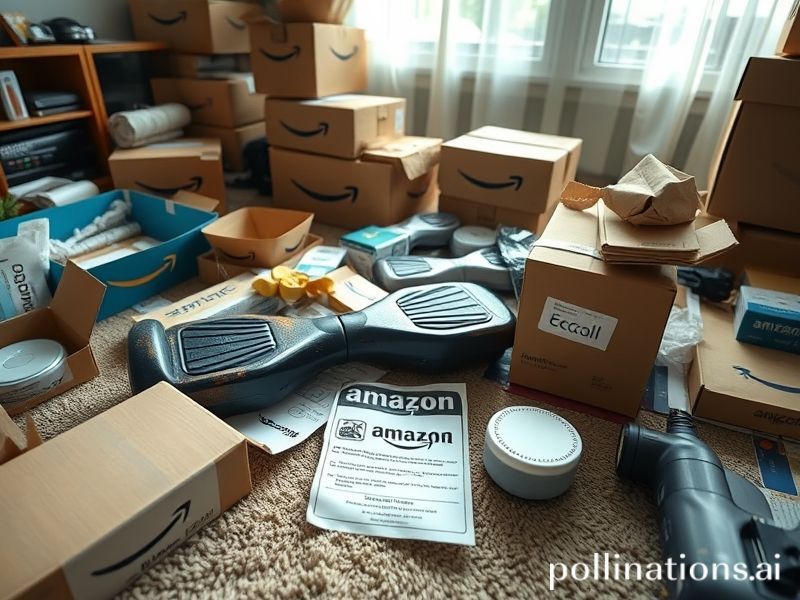Global Recall Rodeo: How Amazon Turns the World into One Big, Flammable Flea Market
Amazon Recalls: When the Everything Store Discovers “Everything” Includes Spontaneous Combustion
By Our Correspondent, currently hiding the power bank that once tried to barbecue his passport
It takes a special brand of optimism to order a four-dollar phone charger from a warehouse 7,000 kilometres away and expect it to respect local fire codes. Yet every year millions of us do exactly that, proving that hope—and free shipping—springs eternal. Amazon’s latest globetrotting recall notice, covering everything from flammable hoverboards in Frankfurt to baby sleepers that double as tiny coffins in Manila, is therefore less a shock than a ritual: the quarterly reminder that frictionless commerce still obeys the ancient rule of “you get what you pay for, plus customs duty and third-degree burns.”
The numbers are almost poetic in their absurdity. In the past twelve months, Amazon has yanked more than a million units across forty-seven countries. The offending items include:
• USB-C cables whose copper content is rivalled only by the optimism of their UL-certification stickers.
• Essential-oil diffusers that decided “aromatherapy” should involve actual flames.
• And, a personal favourite, a children’s jungle-gym branded “Backyard Paradise” whose metal rungs were apparently forged from the same alloy used in discount cutlery.
Each recall notice reads like a haiku of regret: “Stop use immediately. Contact seller. Do not look directly at product.”
Globalisation, that glittering promise of a flat world, has merely flattened the nuances of consumer protection. A defective lithium-ion cell made in Shenzhen, warehoused in Slovakia, and drop-shipped to São Paulo is subject to at least four jurisdictions’ definition of “acceptable risk.” The result is a bureaucratic pas de deux in which regulators tango around the inconvenient truth that no one is quite sure whose job it is to stop the thing from exploding. The EU points to Amazon’s Luxembourg headquarters, Luxembourg points to the seller of record in Delaware, Delaware shrugs, and somewhere a teenager in Jakarta wonders why his new gaming mouse just melted the desk.
Emerging markets bear the brunt with a grim stoicism. In Kenya, consumer-protection law is a spirited suggestion rather than a statute; Amazon refunds arrive as gift cards that can only be spent on more Amazon goods, creating a closed loop of regret. Meanwhile, in India, regulators have taken the refreshingly direct approach of raiding Amazon’s local warehouses, seizing inventory like customs officers who’ve read the instruction manual on schadenfreude.
The broader significance? We are witnessing the birth of a new international norm: caveat emptor, but make it same-day delivery. The same algorithms that recommend toothpaste now nudge us toward products tested primarily on wishful thinking. It is a perfect feedback loop of human frailty and corporate agility—one side dazzled by the price, the other by the plausible deniability of the phrase “third-party seller.” Every recall, then, is less a safety measure than a confession: “We too were surprised this thing existed.”
And yet, the parade marches on. Analysts predict the global e-commerce safety market—consultants, testing labs, legal disclaimers in thirty-two languages—will be worth $12 billion by 2026. There is, apparently, no problem capitalism cannot monetise twice: once on the way in, and once on the way to the landfill.
So the next time your doorbell rings and a smiling courier hands over a suspiciously light parcel, remember the immortal words of the Amazon recall FAQ: “Your safety is our top priority.” Right after same-day shipping, quarterly growth, and the faint hope that this time the charger won’t mistake your living room for a bonfire. Until then, keep the extinguisher handy and the receipts handy-er. The world is flat, the packages are flammable, and the customer, as always, is brilliantly, catastrophically right.







